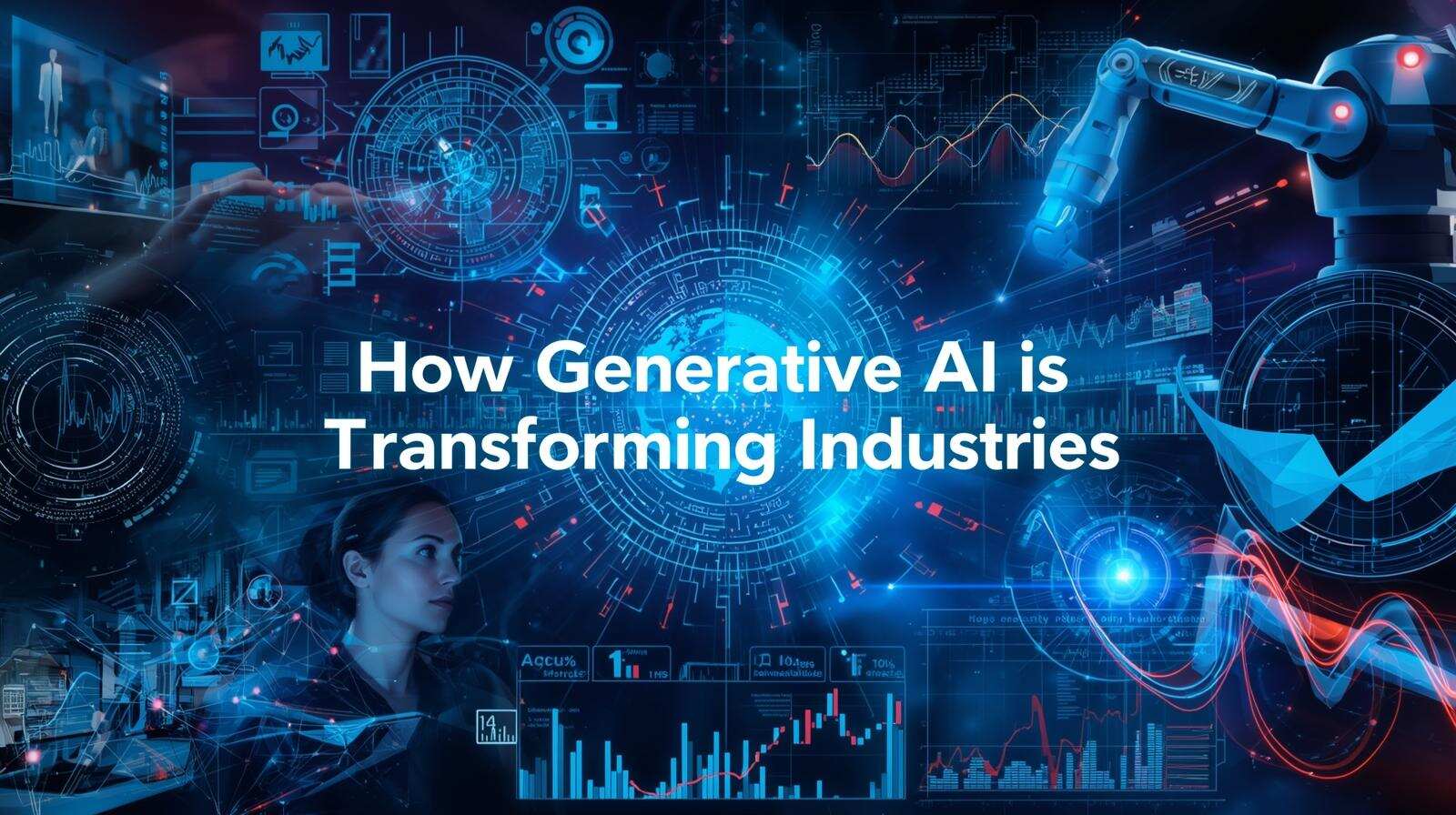Introduction – Why Generative AI is a Game-Changer
In today’s fast-changing digital economy, Generative AI has emerged as one of the most revolutionary technologies, reshaping industries and creating new possibilities for businesses worldwide. Unlike traditional AI models that mainly analyze data and provide predictions, Generative AI goes a step further by producing original content—whether it’s text, images, videos, music, or even software code. This ability to mimic human-like creativity while maintaining machine-level efficiency is why experts believe Generative AI will redefine the future of work, innovation, and customer experience.
Recent reports suggest that the Generative AI market will cross $1.3 trillion by 2032, driven by massive adoption across industries like healthcare, finance, retail, and manufacturing. For businesses, this isn’t just about automation—it’s about enabling creativity at scale. Whether it’s personalizing product recommendations for millions of customers or helping researchers design life-saving drugs, Generative AI is proving its worth as a growth engine.
Moreover, the rise of tools like ChatGPT, DALL·E, MidJourney, and Stable Diffusion has made AI more accessible than ever before. Enterprises that once viewed AI as a futuristic concept are now integrating it into day-to-day operations. The question is no longer “should we adopt AI?” but rather “how generative AI is transforming industries and how can businesses leverage it responsibly?”
What Exactly is Generative AI?
Generative AI, often called GenAI, is a branch of artificial intelligence that focuses on creating entirely new content rather than just analyzing or predicting outcomes. Unlike traditional AI models, which are designed to recognize patterns in existing data, Generative AI goes a step further by using those patterns to generate fresh outputs such as articles, product designs, images, audio tracks, and even complex computer code.
Definition of Generative AI
Generative AI refers to AI systems that can produce new data, insights, and creative outputs. These systems learn from huge datasets and then apply this knowledge to craft original results, making them highly valuable for businesses looking for innovation.
How Generative AI Works
At the heart of Generative AI are advanced machine learning models like:
- Generative Adversarial Networks (GANs) – create highly realistic images or designs.
- Transformers (LLMs) – generate human-like text for conversations, blogs, or code.
- Diffusion Models – produce detailed images, art, and video content.
These models are trained to mimic creativity, delivering outputs that feel human-made but are produced with machine efficiency.
Generative AI vs Traditional AI
- Traditional AI ? Focuses on predictions, classifications, and analysis. Example: spam filtering, fraud detection.
- Generative AI ? Focuses on content creation, design, and innovation. Example: creating personalized marketing campaigns, drafting business proposals, generating product images.
Why Businesses Should Care
With its ability to merge creativity, personalization, and scalability, companies are discovering how Generative AI is transforming industries. From automating tasks to opening up new revenue streams, GenAI is quickly becoming a must-have for businesses that want to stay competitive.
Core Capabilities of Generative AI for Businesses
Generative AI is not just a trend—it delivers practical business value by enhancing creativity, improving efficiency, and enabling hyper-personalization at scale. Here are the four core capabilities that are transforming how businesses innovate and operate.
1. Content Generation Across Formats
Generative AI can produce text, images, videos, and even software code with human-like quality.
- Marketing teams use it to write ad copies, blogs, and product descriptions.
- Designers rely on AI tools like MidJourney or DALL·E for creating visuals.
- Developers use AI assistants to write and debug code faster.
This capability helps businesses save time while producing high-quality, customized outputs.
2. Personalization & Enhanced Customer Experience
Today’s customers expect personalized experiences. Generative AI makes this possible by analyzing user behavior and preferences to create tailored product recommendations, personalized emails, and chat interactions.
- eCommerce brands use it for customized shopping journeys.
- Entertainment platforms use AI to recommend movies, shows, and music.
The result is higher customer satisfaction, loyalty, and improved sales conversions.
3. Process Automation & Efficiency
Generative AI also acts as a powerful automation engine.
- It streamlines repetitive tasks such as report generation, data summarization, and chatbot-driven support.
- In HR, it can screen resumes and generate interview questions.
- In finance, it helps in automated compliance reporting and fraud detection.
This not only reduces operational costs but also frees up employees for more strategic work.
4. Driving Innovation & Product Design
Innovation is the key to business growth, and Generative AI enables it like never before.
- Automotive companies use AI to design and test new vehicle parts.
- Healthcare organizations leverage AI for drug discovery and personalized treatment plans.
- Consumer brands design new products faster by generating prototypes using AI.
By speeding up research and development, Generative AI shortens the time-to-market for new products and services.
Generative AI is giving enterprises the tools to rethink business models and discover how Generative AI is transforming industries with unprecedented creativity, scalability, and efficiency. Companies that embrace these capabilities are positioned to lead the next wave of digital transformation.
Industry-Wise Transformation with Generative AI
Generative AI is not a one-size-fits-all solution. Har industry apni unique challenges aur opportunities ke saath AI ka use kar rahi hai. Yeh section explore karega ki how Generative AI is transforming industries across healthcare, finance, retail, education, media, and manufacturing.
1. Healthcare
Healthcare industry me Generative AI ka impact sabse zyada dramatic hai. AI models patient data analyze karke disease patterns detect karte hain aur personalized treatment plans banate hain.
- Drug Discovery: AI algorithms new compounds design karte hain jo treatments develop karne me madad karte hain.
- Medical Imaging: GANs aur diffusion models high-quality medical images generate karte hain jo diagnostic accuracy improve karte hain.
- Virtual Health Assistants: AI-driven chatbots patient queries handle karte hain, diagnosis me madad karte hain, aur doctor workflows streamline karte hain.
Yeh capabilities healthcare providers ko cost reduce karne aur patient care improve karne me help karti hain.
2. Finance
Finance sector me Generative AI fraud detection, personalized banking, aur automated reporting me use ho raha hai.
- Fraud Prevention: AI real-time transaction data analyze karke suspicious activity detect karta hai.
- Personalized Financial Advice: AI-driven advisors customer ke financial profile ke hisaab se investment suggestions dete hain.
- Document Automation: AI bank statements, compliance reports, aur contracts automatically generate karta hai.
Generative AI se financial firms operational efficiency increase kar rahe hain aur customer trust build kar rahe hain.
3. Retail & eCommerce
Retail me personalization aur customer engagement Generative AI ka key use hai.
- Dynamic Product Descriptions: AI product listings automatically create kar sakta hai based on user behavior.
- Virtual Try-On Experiences: AI-generated AR models customers ko products virtually try karne ka option dete hain.
- Inventory Forecasting: AI demand patterns predict karke supply chain optimize karta hai.
Yeh retailers ko better customer satisfaction aur sales growth dene me help karta hai.
4. Education
Education sector me Generative AI learning experience ko personalize aur accessible bana raha hai.
- AI Tutors: Personalized learning plans aur instant feedback provide karte hain.
- Content Creation: AI lesson plans, quizzes, aur study material generate karta hai.
- Accessibility Tools: Language translation aur text simplification se learning inclusive hoti hai.
Schools, colleges, aur online learning platforms AI ka use karke education ko democratize kar rahe hain.
5. Media & Entertainment
Media industry me content creation aur audience engagement me Generative AI ka impact visible hai.
- Scriptwriting & Storytelling: AI-generated scripts aur plots content production speed badhate hain.
- Music & Art Creation: AI music compositions aur visual art generate karta hai.
- Gaming: AI procedurally game levels design karta hai, creating immersive experiences.
Generative AI creatives ko innovative tools provide karta hai jo storytelling ko redefine karte hain.
6. Manufacturing & Supply Chain
Manufacturing industry me Generative AI design optimization, quality control, aur production efficiency improve kar raha hai.
- Product Design: AI prototypes aur CAD models generate karta hai.
- Predictive Maintenance: Machine learning models equipment failure predict karte hain.
- Supply Chain Optimization: AI demand forecasting aur logistics planning me madad karta hai.
Practical Business Use Cases
Generative AI is not just a theoretical concept — it’s already being applied across various business functions to deliver efficiency, innovation, and better customer experiences. Understanding how generative AI is transforming industries requires a look at the practical ways organizations are integrating this technology into their operations.
Marketing & Content Creation
Generative AI is revolutionizing marketing by enabling the creation of high-quality content quickly and cost-effectively. Marketers can use AI to produce blogs, social media posts, product descriptions, ad copy, and more.
Examples:
- AI-generated blog posts tailored for SEO.
- Automated ad campaigns optimized for specific audiences.
- AI-designed visual creatives for branding and marketing purposes.
This capability allows marketing teams to scale content creation without compromising quality.
Chatbots & Virtual Assistants
Chatbots powered by Generative AI are transforming customer service by providing instant, personalized, and contextually accurate responses. Unlike traditional rule-based chatbots, AI-driven assistants understand nuances and adapt to conversation flow.
Examples:
- AI-driven customer support for instant query resolution.
- Virtual assistants that provide product recommendations and troubleshooting guidance.
- Multilingual chatbots for global customer engagement.
This reduces response time and improves customer satisfaction significantly.
Software Development & Testing
Generative AI is changing the way software is developed and tested. It can automatically generate code, debug errors, and create test cases, significantly reducing development timelines.
Examples:
- AI-generated code snippets for faster software development.
- Automated testing environments that adapt to evolving project requirements.
- Intelligent bug detection and resolution suggestions.
This enables development teams to focus more on innovation while reducing time-to-market.
HR & Recruitment (Resume Screening, Interview Bots)
Human Resource departments are using Generative AI to streamline recruitment and talent management. From resume screening to conducting initial interviews, AI improves both speed and accuracy.
Examples:
- Automated resume parsing and ranking.
- AI-driven interview bots that evaluate candidate responses.
- Personalized onboarding experiences generated for new hires.
By automating these processes, HR teams can focus on strategic initiatives such as employee engagement and training.
Benefits vs Challenges of GenAI Adoption
Generative AI offers immense opportunities for businesses to innovate, improve efficiency, and create personalized experiences. However, adoption also comes with challenges that organizations must address. Understanding both sides is essential to leverage this technology effectively and safely. This is a crucial part of understanding how generative AI is transforming industries.
Benefits: Speed, Innovation, Cost-Efficiency
Generative AI offers several tangible benefits that are driving its rapid adoption across industries:
- Speed: AI models can generate high-quality content, designs, and code at a fraction of the time it would take humans. This accelerates decision-making and project delivery.
- Innovation: Businesses can experiment with new ideas and designs faster, reducing time-to-market and fostering creativity.
- Cost-Efficiency: Automation of repetitive and complex tasks lowers operational costs and increases ROI.
For example, marketing teams can create personalized campaigns instantly, developers can generate code snippets in seconds, and product designers can prototype concepts without extensive manual effort.
These benefits make Generative AI a powerful competitive advantage for businesses aiming to lead the next wave of digital transformation.
Challenges: Bias, Accuracy, Hallucinations
Despite its potential, Generative AI comes with significant challenges that need careful consideration:
- Bias: AI models can unintentionally generate biased outputs if trained on biased datasets.
- Accuracy: Generated content may not always be factually correct, requiring human validation.
- Hallucinations: AI may produce convincing but incorrect or fabricated information.
For businesses, addressing these challenges is crucial to maintaining credibility, accuracy, and trust in AI-driven processes.
Infrastructure & Skills Gap
Adopting Generative AI requires a robust technological infrastructure and skilled workforce. Many organizations face challenges related to:
- Infrastructure: The computational power required for GenAI models can be expensive and complex to maintain.
- Skills Gap: There is a shortage of professionals skilled in AI technologies, making it difficult for companies to build and deploy solutions effectively.
Bridging these gaps is vital for sustainable adoption. Organizations must invest in infrastructure, training, and partnerships to harness the full potential of Generative AI.
Ethical, Moral & Legal Considerations in GenAI
As Generative AI becomes a cornerstone of innovation, it also raises significant ethical, moral, and legal questions. Businesses must not only focus on how generative AI is transforming industries but also ensure that adoption aligns with ethical guidelines and legal frameworks. Failure to address these considerations can result in reputational damage, legal penalties, and loss of customer trust.
Intellectual Property & Copyright Issues
Generative AI produces content based on training data, which raises concerns about intellectual property (IP) rights. Businesses must ensure that AI-generated content does not infringe on copyrighted works or proprietary information.
Key considerations:
- Verifying the originality of AI-generated content.
- Defining ownership of AI-created outputs.
- Licensing models for AI-generated works.
Clear IP policies and careful content review are essential to avoid legal disputes and maintain ethical integrity.
Data Privacy & Compliance
Generative AI systems often rely on large datasets that may include personal or sensitive information. This creates challenges related to data privacy and regulatory compliance.
Key issues:
- Ensuring compliance with data protection laws such as GDPR and CCPA.
- Avoiding misuse of personal data.
- Implementing robust security measures to safeguard data.
Companies must adopt transparent data handling practices and build compliance into their AI deployment strategy.
Responsible AI Practices
Responsible AI involves developing and deploying AI systems in a way that is fair, transparent, accountable, and aligned with human values. Businesses should incorporate responsible AI practices to mitigate risks.
Best practices include:
- Conducting bias audits of AI models.
- Ensuring transparency in AI decision-making.
- Setting clear accountability for AI-driven outcomes.
By committing to responsible AI, organizations can not only leverage GenAI’s benefits but also build trust with customers and stakeholders.
Future of Generative AI: Trends to Watch
Generative AI is still evolving, and the next few years promise even deeper transformations. Understanding how generative AI is transforming industries requires looking ahead to the trends that will shape its future. Businesses that stay ahead of these trends will be better positioned to leverage GenAI for sustained growth and innovation.
Multi-modal AI
Multi-modal AI refers to systems that can process and generate multiple types of data — such as text, images, video, and audio — simultaneously. This capability opens new possibilities for creativity and efficiency.
Examples:
- AI that can generate a video from a written script while adding music and visuals automatically.
- AI systems that combine voice, image, and text to deliver immersive user experiences.
Multi-modal AI will further blur the lines between human creativity and machine-generated outputs, enabling more sophisticated applications across industries.
AI Democratization for SMEs
While large enterprises have led Generative AI adoption, the future points toward democratization, where small and medium-sized enterprises (SMEs) gain access to powerful AI tools. Cloud-based AI platforms and open-source frameworks will play a key role in this shift.
Benefits:
- SMEs can compete with larger organizations by leveraging AI-generated insights and content.
- Reduced entry barriers to advanced AI capabilities.
- Affordable access to AI tools for innovation and growth.
This trend will expand the reach of Generative AI, making it a standard tool for businesses of all sizes.
Human-AI Collaboration at Scale
The future of Generative AI lies in collaboration — combining human creativity and judgment with AI’s ability to generate, analyze, and optimize. This human-AI partnership will enhance productivity and innovation across industries.
Examples:
- Designers collaborating with AI to co-create products.
- Writers using AI tools to brainstorm and structure content.
- Engineers leveraging AI for faster prototyping and testing.
This trend reinforces that Generative AI is not replacing human work but augmenting it, shaping the future of work itself.
How Businesses Can Implement Generative AI
Understanding how generative AI is transforming industries is only the first step. The next challenge for businesses is figuring out how to implement it effectively. From identifying objectives to scaling solutions, successful adoption requires a strategic and structured approach.
Identify Business Goals
The first step in adopting Generative AI is to clearly define the business objectives it will serve. Without a targeted purpose, AI implementation can lead to wasted resources and missed opportunities.
Key considerations:
- Identify areas where Generative AI can deliver measurable value (e.g., marketing, design, operations).
- Define success metrics such as time saved, cost reduction, or revenue growth.
- Align AI projects with the company’s broader strategic goals.
Clear objectives ensure that AI initiatives deliver tangible results and align with the organization’s vision.
Select the Right Tools & Platforms
Choosing the right Generative AI tools and platforms is critical to success. Businesses should evaluate options based on capabilities, scalability, cost, and compatibility with existing systems.
Key steps:
- Research AI platforms like OpenAI, Anthropic, or Hugging Face.
- Evaluate tools that integrate with existing workflows and systems.
- Consider cloud-based solutions for scalability and cost-efficiency.
Selecting the right platform can significantly reduce implementation challenges and accelerate adoption.
Build or Partner with AI Experts
Implementing Generative AI requires specialized skills. Businesses can either build an in-house AI team or partner with expert firms to leverage their knowledge.
Options:
- Hiring data scientists, machine learning engineers, and AI specialists.
- Partnering with AI development companies like Corewave for turnkey solutions.
- Leveraging consulting services to align AI adoption with business strategy.
Partnerships with AI experts can speed up deployment and ensure best practices in development and integration.
Scale Securely and Ethically
Once Generative AI solutions are implemented, scaling them requires careful planning to maintain security, ethics, and efficiency.
Best practices:
- Continuously monitor AI outputs for accuracy and bias.
- Ensure compliance with data privacy regulations.
- Maintain transparency with customers and stakeholders.
Scaling securely ensures long-term success and reinforces trust in AI-driven processes.
Ready for the Next Level of Enterprise Growth?
Generative AI is no longer the future — it is the present reality driving change across industries. Businesses that understand how generative AI is transforming industries and act quickly to adopt it stand to gain a powerful competitive advantage.
At Corewave, we help enterprises navigate this transformation with precision, offering tailored solutions that combine cutting-edge AI technology with strategic business insight. Whether your goal is to enhance customer experiences, streamline operations, or accelerate innovation, we provide the tools and expertise to make it happen.
Why Choose Corewave for Generative AI Implementation:
- Expertise in designing scalable AI-powered solutions.
- Proven track record across industries including healthcare, finance, retail, and manufacturing.
- Strong commitment to ethical and responsible AI practices.
Take the Leap Towards the Future of Business.
Don’t wait for competitors to outpace you. Embrace Generative AI today and transform your business for 2025 and beyond. Let Corewave guide you every step of the way.
? Contact Corewave now to explore how Generative AI can unlock new growth opportunities for your business.
Build AI-Powered, Secure, and Scalable Apps with Corewave
In the rapidly evolving digital landscape, businesses need more than just technology — they need trusted partners who understand how generative AI is transforming industries and can translate that knowledge into innovative, secure, and scalable solutions. At Corewave, we specialize in developing AI-powered applications that empower enterprises to thrive in this new era.
Our approach combines advanced AI capabilities with robust development practices to deliver solutions that are not only powerful but also secure and scalable. We work closely with clients to understand their unique needs and craft applications that deliver tangible value.
Corewave’s Expertise Includes:
- Custom AI App Development: Tailored AI solutions that fit specific business requirements.
- Secure AI Deployments: State-of-the-art security protocols to protect sensitive data.
- Scalable Solutions: Flexible systems designed to grow with your business needs.
- Integration with Existing Systems: Smooth integration ensuring minimal disruption to workflows.
Why Corewave is the Ideal AI Partner:
- Deep expertise in AI and app development.
- Proven track record of delivering high-quality projects.
- Commitment to ethical AI implementation and compliance.
Generative AI is transforming industries at an unprecedented pace. With Corewave as your partner, you can turn this transformation into your competitive advantage.
? Contact Corewave today to start building AI-powered applications that are secure, scalable, and future-ready.
FAQs — How Generative AI is Transforming Industries
What is Generative AI, and why is it important for businesses?
Generative AI is a subset of artificial intelligence that can create new content such as text, images, videos, or code by learning from existing data. It’s important because it enables businesses to innovate faster, personalize experiences, and improve operational efficiency. Understanding how generative AI is transforming industries is key to staying competitive.
Which industries are most impacted by Generative AI?
Generative AI is transforming industries such as healthcare, finance, retail, education, media, entertainment, manufacturing, and logistics. Each industry benefits in unique ways, from personalized services to faster product design and smarter automation.
How does Generative AI differ from traditional AI?
Traditional AI focuses on analyzing data and automating tasks, whereas Generative AI creates new, original content by learning patterns from data. This creative capability is what makes how generative AI is transforming industries a powerful topic for business leaders.
What are the key technologies behind Generative AI?
Key technologies include Large Language Models (LLMs), Generative Adversarial Networks (GANs), diffusion models, and transformers. These enable Generative AI to produce high-quality outputs across multiple formats.
What are the main benefits of Generative AI for businesses?
Generative AI improves speed, innovation, personalization, and cost-efficiency. It allows businesses to produce creative content, enhance customer experiences, and automate processes more effectively.
What challenges do businesses face when adopting Generative AI?
Challenges include data privacy concerns, model bias, hallucinations, infrastructure costs, and a skills gap in AI expertise. Businesses must address these challenges to maximize Generative AI’s benefits.
How can businesses implement Generative AI effectively?
Businesses should start by defining clear goals, selecting the right AI tools, building or partnering with AI experts, and ensuring secure and ethical deployment. This structured approach ensures success in leveraging how generative AI is transforming industries.
What ethical concerns are associated with Generative AI?
Ethical concerns include copyright infringement, biased outputs, data privacy issues, and transparency in AI decision-making. Responsible AI practices are essential to mitigate these risks.
What does the future of Generative AI look like?
The future will see trends like multi-modal AI, AI democratization for SMEs, and large-scale human-AI collaboration. These trends will continue to accelerate how generative AI is transforming industries.
Why should businesses choose Corewave for Generative AI implementation?
Corewave offers expertise in building AI-powered, secure, and scalable solutions tailored to specific business needs. With proven experience across industries, Corewave helps companies leverage Generative AI strategically and responsibly.









.jpg)


